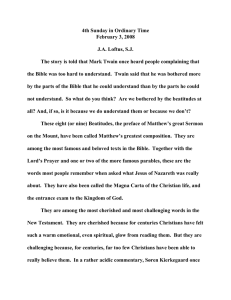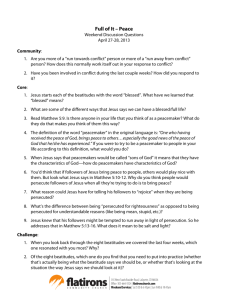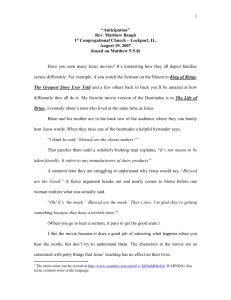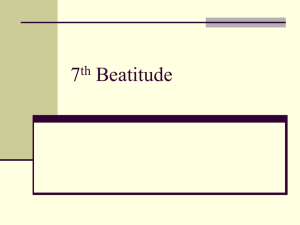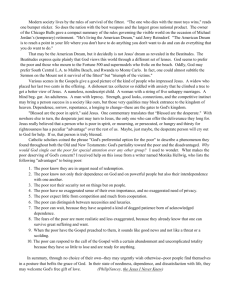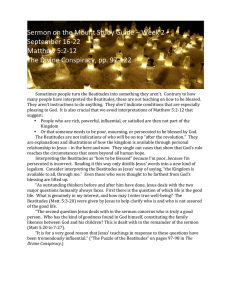4 Sunday in Ordinary Time January 30, 2011 10 Am and Noon Liturgies
advertisement
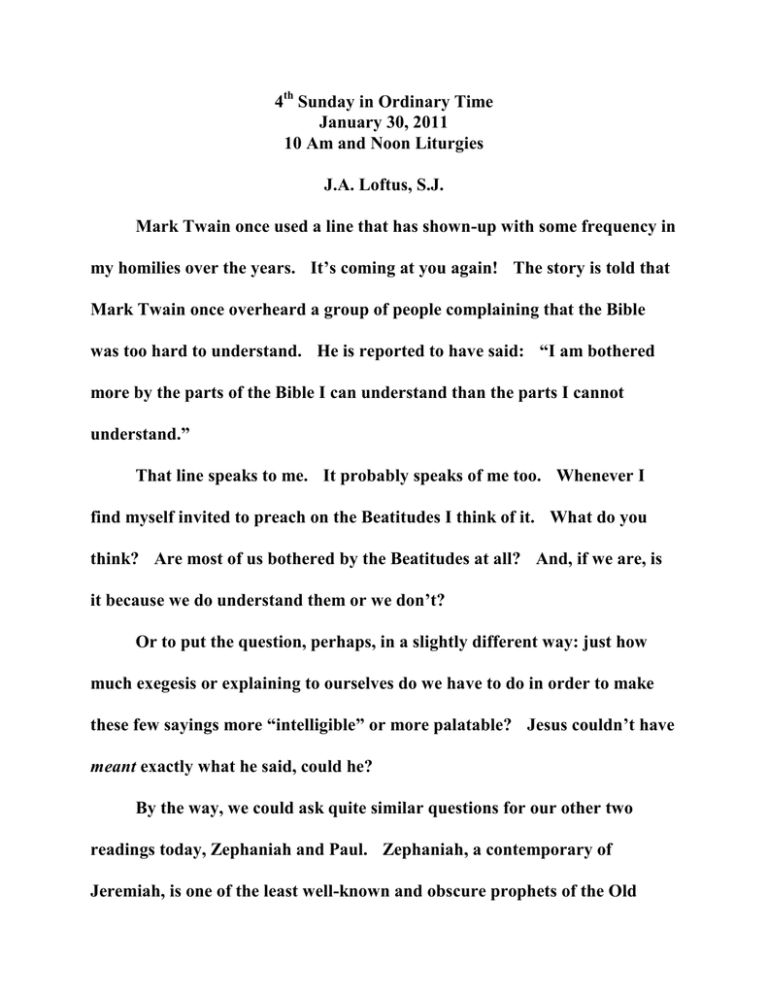
4th Sunday in Ordinary Time January 30, 2011 10 Am and Noon Liturgies J.A. Loftus, S.J. Mark Twain once used a line that has shown-up with some frequency in my homilies over the years. It’s coming at you again! The story is told that Mark Twain once overheard a group of people complaining that the Bible was too hard to understand. He is reported to have said: “I am bothered more by the parts of the Bible I can understand than the parts I cannot understand.” That line speaks to me. It probably speaks of me too. Whenever I find myself invited to preach on the Beatitudes I think of it. What do you think? Are most of us bothered by the Beatitudes at all? And, if we are, is it because we do understand them or we don’t? Or to put the question, perhaps, in a slightly different way: just how much exegesis or explaining to ourselves do we have to do in order to make these few sayings more “intelligible” or more palatable? Jesus couldn’t have meant exactly what he said, could he? By the way, we could ask quite similar questions for our other two readings today, Zephaniah and Paul. Zephaniah, a contemporary of Jeremiah, is one of the least well-known and obscure prophets of the Old Testament. His only significant contribution to the theology of the Hebrew scriptures is the notion of the anawim, the faithful remnant of Israel, the poor who will inherit the kingdom. Listen to him again. Could he really mean just what he’s saying? “Seek justice, seek humility, perhaps you may be sheltered on the day of the Lord’s anger.” Old Zeph was a dower soul. But he actually expects that the faithful remnant of Israel “will experience no more lies, no more deceit, the people will be humble and lowly.” One wonders what sort of world he lived in, surely not a world like ours. Or surely not a church like ours either. Is he serious? Or how about St. Paul? Listen to his description of the church at Corinth: not many are wise by human standards, not many are powerful, not many are of noble birth. Rather, Paul tells them (and perhaps us): “God chooses the foolish of the world to shame the wise, and God chooses the weak of the world to shame the strong, and God chooses the lowly and despised of the world, those who count for nothing, in order to reduce to nothing those who are something....” If I wrote that letter to you, the 21st century church at Chestnut Hill, many of you would be insulted. What do you mean I’m not wise, or strong, or honored? I’ve worked hard to be all those things. Yet St. Paul lists those 2 who think they are something with those who, in fact, are nothing. All three of today’s authors, writing out the mists of history to you and me, seem to agree. They all point in their own way to a Jesus who just might have meant exactly what he said that windy day on the mount in Palestine. If you try to hear these soaring words of the Beatitudes as if you are hearing them for the first time, what kind of reaction do you have? For many of us these words are so familiar and so beautiful (to hear anyway, if not to practice) that they lose their revolutionary power. These powerful words fall on contemporary ears like worn knives that have lost their cutting edge. Listen again as praise is heaped on the poor, the mourning, the hungry, the meek, the merciful, the peacemakers and the persecuted. The words may anger you; they may simply amaze you; they may confuse you; they may inspire you. But they will not bore you; these are not dull words. The great Protestant theologian Søren Kierkegaard, in a rather acidic moment, once said of these words: “We have no thought of seriously believing Jesus...We enjoy our worldly comforts and we get a faint emotional glow from reading of the Jesus whom we would never be so foolish as to obey.” He might have been having a bad day. Rather harsh, but challenging. 3 Some of the more cynical among us, or some trying to be more comedic, actually poke fun at the naivete in these words. Someone once said: “The meek may inherit the earth...but they’ll never be able to hold onto it.” Or another wag suggested: “The meek may inherit the earth, but in the meantime it belongs to the conceited. Like me.” Can you hear a little voice in your head whispering something like: “these are lovely sayings, beautiful idealism, wonderfully spiritual. But it’s not practical. It won’t work in this kind of world. Try taking the Beatitudes to your workplace. It’s not going to work.” My brothers and sisters, the soaring rhetoric of the Beatitudes is stunning drama, but it seems to be of little real use. They just contradict the common sense we all know. So how much will we have to re-interpret them, theologize them, spiritualize them in order to try to live them? I wonder how many of you might be getting angry at me, or maybe even depressed listening to me because I seem to be ruining such a lovely passage? I can’t blame you. But these revered words were never intended to be internalized and idealized only as a lovely spiritual treatise. Nor were they intended to be just an ethical injunction either. They are intended to be the incarnated sign of God’s kingdom on earth–in us! 4 The poor in spirit, the hungry, the meek, the peacemakers, the persecuted are supposed to be us! And then Jesus says: we will be honored, blessed, happy beyond our wildest dreams. I think I understand Mark Twain better now. I, too, am bothered more by the parts of the Bible that I do understand than by the parts I don’t understand. Today’s gospel–for better or worse–I do understand. Now I just have to pray to believe it. And then just try to live it. Peace! 5
